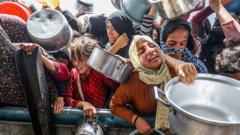The talk of humanitarian crises and allegations of war crimes is intensifying in light of Israel's sustained blockade of Gaza, which has left millions in desperate conditions. Philippe Lazzarini, the commissioner-general of the UN Relief and Works Agency for Palestine Refugees in the Near East (Unrwa), spoke candidly about the deepening plight of civilians in Gaza, stating, "This is the weaponization of humanitarian aid."
More than two months into the current hostilities, millions of Gazans have been deprived of essential food supplies. The International Committee of the Red Cross has expressed concern over the catastrophic living conditions, with civilians caught between ongoing military action and a shortage of humanitarian assistance. Pascal Hundt, the organization's deputy director of operations, noted that "an overwhelming daily struggle to survive" has become a norm for the local population.
The renewed conflict, ignited on March 18 after the breakdown of a two-month ceasefire, has seen Israel ramp up military offensives and impose increasingly stringent controls on humanitarian aid deliveries. Israeli Prime Minister Benjamin Netanyahu, facing mounting pressure from hardline political factions, has professed intentions for a new offensive. This strategy is reported to include plans for widespread civilian displacement as the Israeli government seeks to weaken Hamas’s grip on power.
Beyond the immediate crisis is a chilling statistic from the Integrated Food Security Phase Classification (IPC), which categorizes a significant proportion of Gaza's population as "Phase 5 – catastrophe," indicating extreme hunger and potential starvation. The IPC’s reports indicate that 470,000 Gazans could face severe malnutrition, compounded by the ongoing blockade that prevents critical aid from entering.
As the humanitarian situation deteriorates, Netanyahu's administration remains unfazed by accusations of using starvation as a strategy against Hamas. Israel’s Minister of National Security, Itamar Ben-Gvir, characterized the cessation of humanitarian aid as a crucial component in applying pressure on Hamas, reaffirming the Israeli government’s commitment to national defense.
Meanwhile, Lazzarini openly questioned the implications of Israel's actions, asserting that such tactics could constitute war crimes, with genocidal elements potentially arising from widespread hunger and devastation. He has also been vilified by Israeli officials for allegedly misrepresenting the situation in Gaza.
Despite the claims of ongoing hostility from Hamas, critics argue that the Israeli campaign against Gaza represents one of the harshest military responses witnessed in decades. Global reactions are brewing as key political figures, including U.S. President Donald Trump, increasingly distance themselves from Netanyahu's approach to Gaza.
The humanitarian landscape in Gaza not only exposes deep-seated political fractures within the region but also presents a moral conundrum for the international community, which struggles to find effective responses amidst rising accusations of crimes against humanity. The potential ramifications of the ongoing siege will likely haunt global politics for years to come, leaving an indelible mark on the future of the Israeli-Palestinian conflict.


















